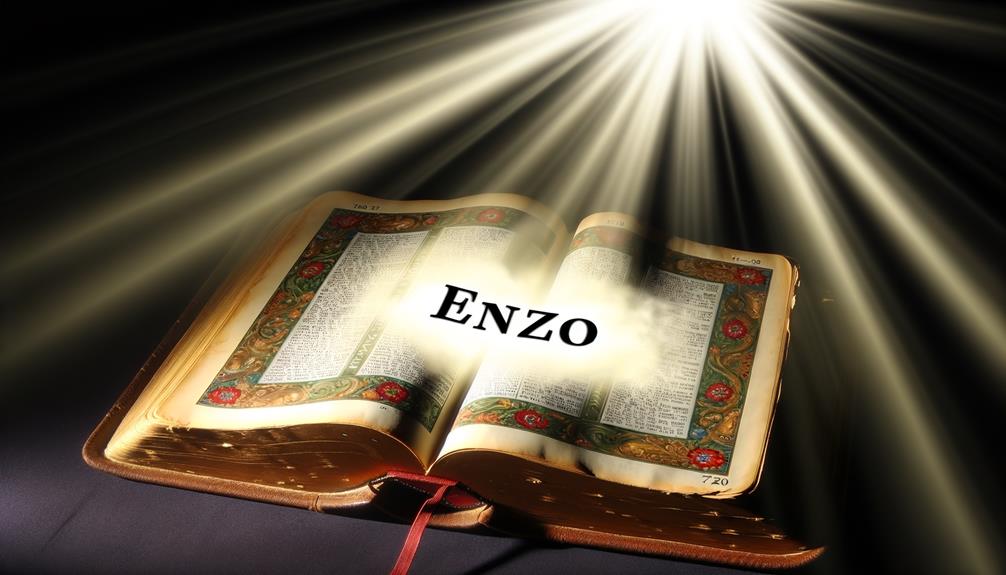Enzo Meaning in Bible Verse: Spiritual Significance
The name Enzo does not appear directly in biblical texts, but its deep roots in Italian and Germanic traditions convey significant meanings of leadership and strength. Enzo derives from Lorenzo or Vincenzo in Italian, and Anzo in Germanic, signifying ‘ruler’ or ‘giant.’ Although not biblical, Enzo shares thematic resonance with biblical names that encapsulate destiny and character, such as Enosh or Henry, which means ‘ruler of the household.’
This rich etymological and cultural background underscores Enzo’s symbolic attributes of wisdom and victory, echoing broader biblical narratives. Discovering these connections enhances our understanding of Enzo’s profound significance.

Enzo Meaning in the Bible: Origins, Significance, and Spiritual Insights
| Aspect | Description |
|---|---|
| Origin of the Name | Italian, derived from the German name Heinz (short for Heinrich), meaning “ruler of the household.” |
| Biblical Appearance | The name Enzo does not appear directly in the Bible. |
| Spiritual Significance | Symbolizes leadership, strength, and guidance, qualities valued in biblical teachings. |
| Possible Biblical Parallels | Similar to biblical names like Enoch (dedicated) or Ezra (helper), which carry spiritual significance. |
| Meaning of the Name | Often interpreted as “winner,” “conqueror,” or “ruler,” reflecting strong leadership qualities. |
| Biblical Principles Connection | Reflects values such as stewardship, wisdom, and godly leadership (Proverbs 3:5-6, 1 Timothy 3:5). |
| Virtues Associated | Courage, responsibility, faithfulness, and integrity, which align with biblical character traits. |
| Cultural Influence | Popular in Italian and Spanish cultures, with spiritual resonance tied to strength and purpose. |
| Related Biblical Concepts | Leadership, Wisdom, Stewardship, Faith, God’s Guidance, Responsibility, Authority. |
Origin of the Name Enzo

The name Enzo has its origins rooted in both Italian and Germanic linguistic traditions, providing it with a rich and multifaceted etymology.
In Italian, Enzo is often considered a diminutive of Lorenzo or Vincenzo, both of which have significant historical and cultural resonance. Lorenzo means ‘from Laurentum,’ a city renowned in ancient Rome, while Vincenzo translates to ‘conquering’ or ‘victorious.’
In the Germanic tradition, Enzo is derived from the name Anzo, which means ‘giant’ or ‘ruler.’
This dual linguistic heritage imbues the name with layers of meaning, reflecting notions of leadership, victory, and stature.
The name’s adaptability across cultures underscores its enduring appeal and complex significance, providing a robust framework for further exploration.
Enzo in Historical Context

Examining the historical context of the name Enzo reveals its multifaceted origins, including its etymological roots in Italian and Germanic traditions.
While not directly mentioned in Biblical texts, the name’s evolution and usage can be linked to various cultural and religious influences over centuries.
Understanding these influences provides a thorough view of how the name Enzo has been contextualized and interpreted within different periods and communities.
Origins of Enzo
Tracing the origins of the name Enzo reveals a rich tapestry woven from historical, cultural, and linguistic influences.
Enzo, primarily an Italian name, is considered a diminutive form of the Germanic name Heinz, itself derived from Heinrich, meaning ‘home ruler.’
The name also finds roots in the Latin Vincenzo, meaning ‘to conquer’ or ‘to win.’ Enzo gained prominence during the Middle Ages and was popularized by notable figures such as Enzo of Sardinia, a 13th-century prince.
Additionally, Enzo’s adaptability across different languages and cultures, including Spanish and Portuguese, underscores its enduring appeal.
This multifaceted history not only illustrates the name’s diverse origins but also its remarkable journey through time and geography.
Biblical Name References
While Enzo itself is not directly mentioned in biblical texts, its linguistic and historical connections to names of significant biblical figures provide a fascinating lens through which to explore its contextual relevance.
The name Enzo can be linked to the Hebrew name ‘Enosh,’ meaning ‘man’ or ‘human.’ Enosh, a grandson of Adam, signifies the beginning of human civilization and societal development in the Bible. This connection to foundational biblical narratives underlines themes of humanity and legacy.
Additionally, the Italian roots of Enzo, derived from ‘Henricus’ or ‘Heinz,’ echo the biblical Henry, meaning ‘ruler of the household.’ Such associations enrich our understanding of Enzo’s deeper, multifaceted significance, reflecting both ancient human origins and leadership qualities.
Biblical Significance of Names

Understanding the biblical significance of names necessitates a deep exploration of the cultural, historical, and theological contexts that underscore their meanings within the sacred texts.
In biblical times, names often encapsulated profound attributes, destinies, or divine purposes. For instance, the name ‘Isaiah’ means ‘Yahweh is salvation,’ reflecting a theological assertion of God’s saving power. Similarly, ‘Abraham,’ meaning ‘father of many,’ signifies the covenantal promise of numerous descendants.
These names were not mere labels but were imbued with identity, mission, and prophetic insight. The act of naming carried weight and intentionality, often revealing God’s character or His plans for humanity.
Consequently, names in the Bible serve as conduits for deeper spiritual truths and historical narratives.
Spiritual Meaning of Enzo

In the quest to decipher the spiritual meaning of the name Enzo within a biblical context, it is imperative to examine both its linguistic roots and the cultural narratives that might imbue it with deeper significance.
Originating from the Germanic name Anzo, which means ‘ruler’ or ‘giant,’ Enzo encapsulates attributes of leadership and strength. These characteristics align with biblical archetypes of divinely sanctioned leaders.
- Historical Context: The name’s Germanic origins reflect a cultural heritage of leadership.
- Linguistic Analysis: The meaning of “ruler” or “giant” suggests a spiritual role of guidance.
Understanding these dimensions enriches the name’s spiritual significance.
Enzo and Italian Heritage

The name Enzo carries profound cultural significance within Italian heritage, reflecting a rich tapestry of history and tradition.
Frequently found in Italian naming conventions, Enzo has been borne by numerous historical figures, further cementing its legacy.
To fully appreciate its biblical connotations, one must consider how this name’s historical and cultural roots have shaped its contemporary resonance.
Cultural Significance of Enzo
Enzo, a name deeply rooted in Italian heritage, encapsulates a rich tapestry of cultural and historical significance that extends beyond its biblical references. Its cultural resonance in Italy is multifaceted, reflecting various dimensions of Italian life and identity.
- Historical Figures: Enzo has been borne by notable historical figures, such as Enzo Ferrari, the founder of the iconic car manufacturer, symbolizing innovation and excellence in Italian engineering.
- Literary Presence: The name appears in Italian literature, often embodying characters marked by courage, leadership, and depth, reflecting cultural values.
- Traditional Celebrations: Enzo is a popular name in Italian communities, often associated with familial traditions and celebrations, highlighting its enduring cultural relevance.
This intricate cultural context enriches the understanding of Enzo beyond its biblical connotations.
Enzo in Italian Names
Italian naming conventions often reflect a deep connection to heritage and tradition, with the name Enzo standing as a symbol of the enduring legacy of Italian culture.
Derived from the Germanic name Heinz, Enzo has evolved within the Italian lexicon to signify a range of meanings, including ‘ruler of the home’ or ‘winner.’ Its prominence in Italian society underscores a collective respect for historical roots and familial ties.
Additionally, Enzo’s versatility allows it to serve both as a standalone name and a diminutive of Lorenzo or Vincenzo, further embedding it within the cultural fabric.
This adaptability illustrates the Italian penchant for names that honor lineage while embracing contemporary relevance, ensuring that the name Enzo remains a timeless fixture in Italian heritage.
Historical Figures Named Enzo
Frequently celebrated for their contributions to Italian history, numerous historical figures named Enzo have left an indelible mark on various fields, reflecting the rich tapestry of Italian heritage.
- Enzo Ferrari: Founder of the iconic automotive company Ferrari, Enzo Ferrari’s legacy endures in both the racing and luxury car industries, epitomizing Italian innovation.
- Enzo Siciliano: A multifaceted literary figure and critic, Siciliano played a significant role in post-war Italian literature, influencing contemporary thought and cultural discourse.
These figures exemplify the diverse impact of individuals named Enzo on Italian culture and beyond.
Enzo in Modern Christianity

In the context of modern Christianity, the name Enzo has garnered renewed interest, often examined through its etymological roots and potential symbolic meanings within biblical narratives.
Derived from the Italian diminutive of Vincenzo or Lorenzo, Enzo can signify ‘home ruler’ or ‘victorious.’
This name’s resurgence is not merely a cultural trend; it embodies a deeper theological exploration.
In contemporary Christian contexts, Enzo is often interpreted as a symbol of divine guidance and leadership, reflecting the qualities of biblical patriarchs and leaders.
Its increasing popularity among Christian families may be attributed to a desire for names that resonate with spiritual depth and historical significance, encapsulating virtues such as strength, victory, and moral leadership.
Enzo’s Symbolic Attributes

The name Enzo, with its roots in Italian culture, encapsulates a rich tapestry of symbolic attributes that align with themes of leadership, victory, and divine guidance within Christian theology. These attributes are deeply interwoven with the broader narratives found in biblical texts, offering a multifaceted understanding of the name’s significance.
- Leadership: Enzo is often associated with strong, guiding figures who lead with wisdom and integrity, resonating with biblical leaders who directed their communities under divine mandate.
- Victory: The name implies triumph over adversity, echoing stories of biblical heroes who overcame great challenges through faith.
- Divine Guidance: Enzo symbolizes the assurance of divine presence, aligning with the Christian belief in God’s guidance and protection.
These attributes offer a profound insight into Enzo’s theological resonance.
Enzo in Religious Texts

Exploring the historical context of the name Enzo within religious texts reveals its multifaceted roots, which are not directly biblical but carry significant cultural weight.
Enzo appears in various Christian traditions, often linked to names like Enzio or Henry, reflecting its adaptation over time.
Examining the symbolic meaning of Enzo, one can find parallels in biblical names that embody leadership, strength, and divine favor, aligning with the broader theological themes present in scripture. This connection suggests that Enzo may represent not only a figure of authority but also a bridge between the earthly and the divine, invoking a sense of responsibility inherent in true leadership. Just as biblical figures were called to fulfill their roles within God’s plan, Enzo embodies the idea that one must recognize their duties and privileges. As the saying goes, “give caesar what belongs to caesar,” emphasizing the importance of acknowledging both spiritual obligations and societal responsibilities in one’s journey.
Historical Context of Enzo
How does the name Enzo, though not directly mentioned in canonical religious texts, fit within the broader historical and cultural contexts of biblical names and their significance?
Enzo, with its roots in Italian and Germanic traditions, reflects the evolving nature of names through historical periods influenced by Christianity. Biblical names often carry profound meanings, symbolic of virtues or divine attributes, a trait shared by Enzo.
- Historical Adaptation: Enzo, derived from Heinz (a diminutive of Heinrich), illustrates the adaptation of names across cultures and epochs.
- Cultural Interchange: The spread of Christianity facilitated the blending of local and biblical names, enriching the cultural tapestry.
- Symbolic Resonance: Names like Enzo, while not biblical, carry personal and cultural significance, echoing the symbolic weight of biblical counterparts.
Enzo in Biblical Names
Integrating the name Enzo into the framework of biblical names invites an exploration of its etymological roots and potential symbolic parallels within religious texts.
While Enzo itself is not directly mentioned in the Bible, its origins can be traced back to the Germanic name Heinz or the Italian name Lorenzo.
The process of examining Enzo within a biblical context involves understanding its linguistic journey and how it aligns with the naming conventions found in biblical scripture.
Names in the Bible often carry deep meanings and reflect the character or destiny of individuals.
Symbolic Meaning of Enzo
To understand the symbolic meaning of Enzo within religious texts, it is imperative to contemplate how its etymological roots and historical usage might resonate with the spiritual and moral themes prevalent in biblical narratives.
Derived from Italian and Germanic origins, often meaning ‘ruler of the household’ or ‘winner,’ Enzo can be associated with:
- Leadership and Stewardship: Reflecting the biblical emphasis on righteous leadership and stewardship, akin to figures like King David.
- Victory and Conquest: Resonating with the triumphs of biblical heroes who overcame adversity through faith.
These themes collectively enhance our understanding of Enzo’s potential symbolic significance within the context of biblical teachings.
Enzo’s Relevance Today

Enzo’s relevance today can be understood through its cultural resurgence and its symbolic resonance within various modern contexts. The name Enzo has seen a revival, particularly in Western cultures, where it is appreciated for its unique blend of tradition and modernity. The following table illustrates the contexts in which Enzo remains significant:
| Context | Significance | Example |
|---|---|---|
| Cultural Resurgence | Popularity in naming trends | Increased baby name usage |
| Symbolic Resonance | Connotations of strength and leadership | Use in literature and films |
| Historical Reference | Connection to historical figures | Names of notable leaders |
| Religious Influence | Biblical and spiritual connotations | Interpretations in modern sermons |
This multifaceted relevance underscores Enzo’s enduring appeal in contemporary society.
Enzo and Personal Identity

A name like Enzo can markedly shape personal identity by imbuing individuals with a sense of historical continuity and cultural richness. The name Enzo, of Italian origin, often associated with meanings like ‘ruler of the household,’ contributes layers of significance to one’s self-perception and social identity.
The impact of such a name can be analyzed through various dimensions:
- Cultural Heritage: Enzo connects individuals to Italian history and traditions, fostering a sense of belonging.
- Historical Resonance: Names carry the weight of past leaders and notable figures, enhancing personal legacy.
Understanding these aspects helps in grasping how the name Enzo shapes personal identity in a multifaceted manner.
Conclusion
In examining the name Enzo, its origins, historical context, and biblical significance reveal a complex tapestry of spiritual and cultural dimensions.
The spiritual meanings attributed to Enzo, its symbolic attributes, and its resonance in religious texts underscore its multifaceted relevance.
Enzo’s enduring significance in Italian heritage and its impact on personal identity today further accentuate its timeless appeal.
This exploration demonstrates that Enzo is not merely a name but a profound emblem of heritage, spirituality, and identity.






